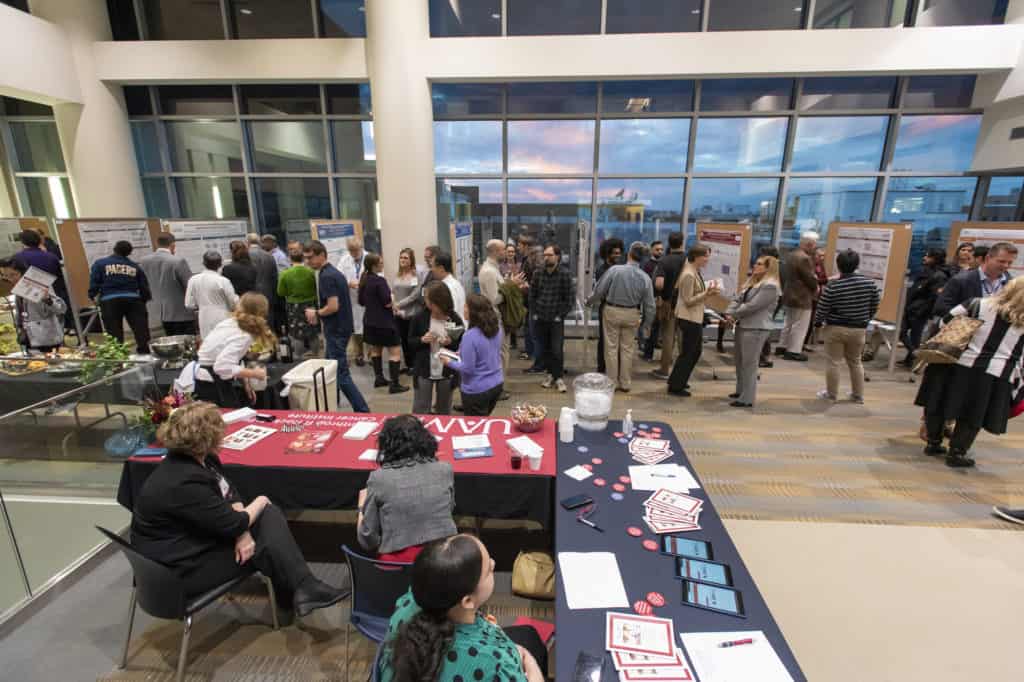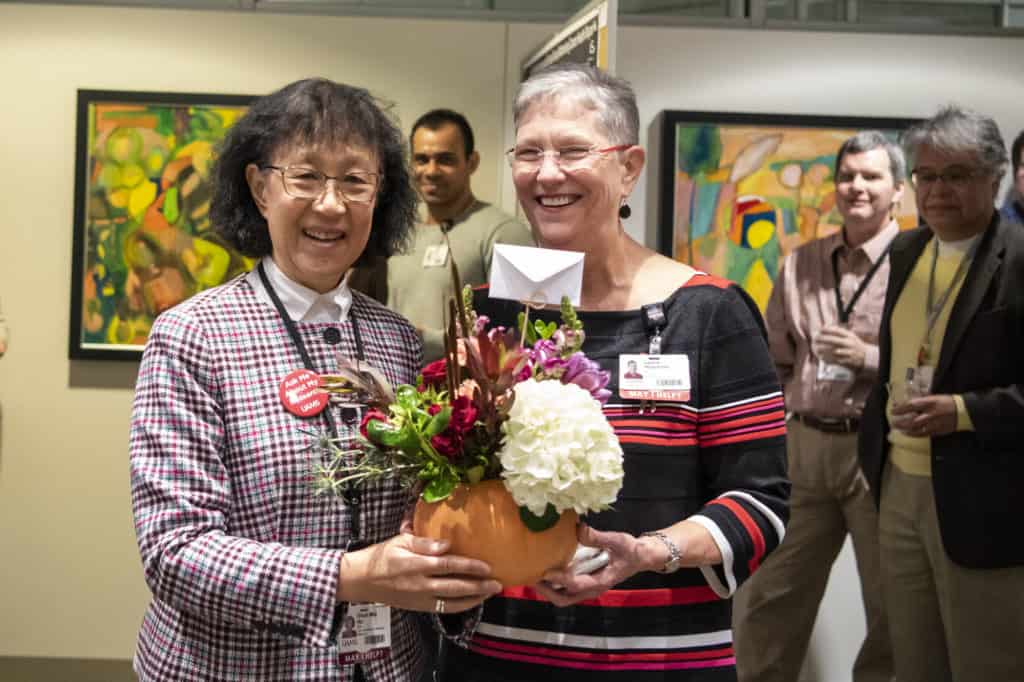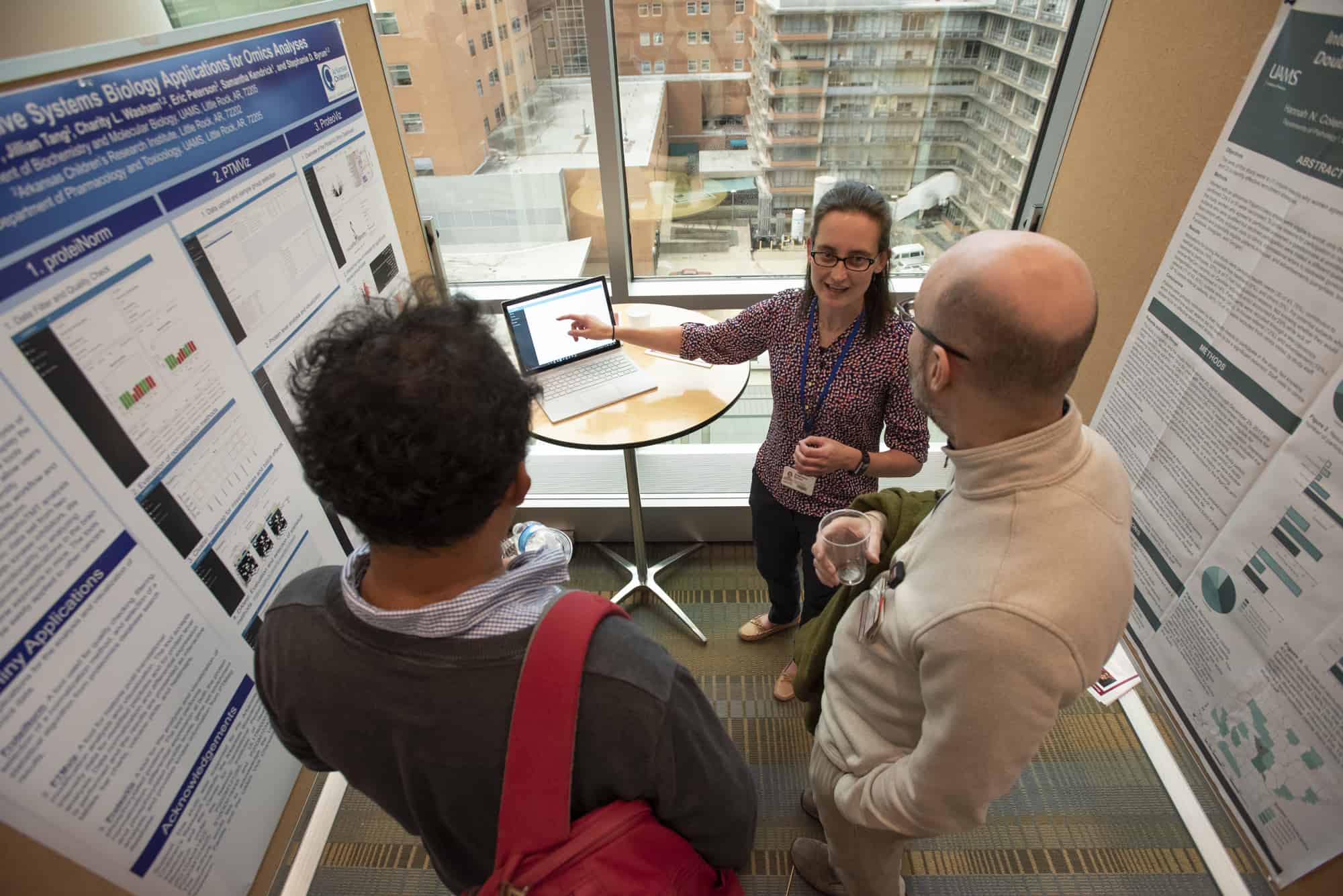Cancer Research Highlights Largest-Ever Showcase of Medical Discoveries
| Scientists conducting cancer research in the lab, clinic and community gathered Nov. 20 at the 26th UAMS Showcase of Medical Discoveries to share their projects and discuss ways to work together.
A quarterly event, the showcase is designed to highlight research areas across UAMS and encourage collaboration among scientists. Cancer research served as the focus of the event held at the UAMS Winthrop P. Rockefeller Cancer Institute. It attracted about 170 attendees from research and clinical areas to learn about the university’s wide scope of cancer research projects.
The showcase was co-sponsored by the UAMS Office of Research in conjunction with the Cancer Institute, College of Medicine and Office of Institutional Advancement.

About 170 people attended the Showcase of Medical Discoveries, which featured 40 posters highlighting cancer research programs and services at UAMS.
“This is an excellent time to highlight our cancer research programs, as we focus our efforts on attaining National Cancer Institute Designation and transition to new Cancer Institute leadership under director Dr. Michael Birrer. As we take stock of our strengths, we look forward to advancing our research programs on a strong new trajectory in the upcoming decade,” said Shuk-Mei Ho, Ph.D., vice chancellor of research.
Birrer, a medical oncologist who specializes in gynecologic cancers, joined the Cancer Institute as vice chancellor and director in late 2019.
In early 2019, the UAMS Cancer Institute received unanimous support in both the Arkansas Senate and House for its quest to achieve designation by the National Cancer Institute. An annual state allocation of $10 million will support this effort.
Ho stressed that the allocation designated by the Legislature is essential and illustrates the overarching support for designation among leaders and citizens in Arkansas.
“We have established a good foundation at UAMS toward achieving NCI Designation. The state’s support and enthusiasm for this important goal is a vital part of that,” Ho said.
To achieve designation, cancer centers undergo a highly competitive assessment process that demonstrates an outstanding depth and breadth of basic laboratory, patient/clinical and population-based research. The designation brings with it many benefits, including expanded access to federal funding for researchers and improved access to clinical trials for patients.

Genetic counselor Mindy Simonson discusses her research with Robert McGehee Jr., dean of the UAMS Graduate School.
At the showcase, researchers displayed 40 scientific posters representing Cancer Institute programs and numerous UAMS colleges and academic departments. Together with their colleagues, the scientists joined in lively discussions about the implications and goals of their research. Of the 26 showcases the UAMS Office of Research and Innovation has presented, this one was by far the largest, Ho said.
Genetic counselor Mindy Simonson and Kristin Zorn, M.D., chair of the Division of Gynecologic Oncology, shared a poster they recently presented at the National Society of Genetic Counselors Annual Meeting in Salt Lake City.
Their project examines how better to identify and streamline the referral process for patients with hereditary cancers.

Isabelle Racine Miousse, Ph.D., assistant professor in the UAMS Department of Biochemistry and Molecular Biology, shares information about her cancer research.
“We are working to build an adaptive questionnaire using electronic medical records to automatically generate a referral for patients who meet certain qualifications related to hereditary cancers,” Simonson said.
Although the process has presented technological challenges, the idea generated much excitement among participants at the Utah conference.
“A lot of people are interested in this concept and have talked to us about how it could work in various settings,” Simonson said.
Other scientists shared information related to their laboratory research, including Samantha Kendrick, Ph.D., assistant professor in the UAMS College of Medicine Department of Biochemistry and Molecular Biology.
Kendrick’s research focuses on treatment resistance in aggressive diffuse large B-cell lymphoma.
“We are working to find a way to shut off B-cell receptor signaling pathways at the DNA level. If we can develop a drug to target these genes, the disease could become more sensitive to chemotherapy and lead to better outcomes for patients,” Kendrick said.
In addition to viewing the wide range of cancer research programs and gathering information about potential collaborations, attendees also learned about the Cancer Institute’s infrastructure and research core facilities available to support their work.

Shuk-Mei Ho, Ph.D., (left) recognized Laura Hutchins, M.D., (right) at the event and honored for her many years of service to UAMS.
In a brief presentation, Ho recognized Laura Hutchins, M.D., for her more than 30 years of service to UAMS and its cancer programs. Hutchins served in multiple roles at UAMS, including division director of the UAMS Division of Hematology/Oncology for 15 years and program director of the UAMS Hematology/Oncology Fellowship Program for 10 years.
She held the prestigious Virginia Clinton Kelley Endowed Chair for Clinical Research from March 2007-December 2018 and was associate director for clinical research in the Cancer Institute for 20 years. For 18 months, she served as Cancer Institute interim director while the search for the new director was underway.
“Dr. Hutchins is one the strongest friends of research we have at UAMS. She champions this place in many ways and we are so thankful for her contributions,” Ho said. Hutchins plans to retire in early 2020.
